September 28, 2025. North America East Coast Lecture Tour (3) Toronto
Hello. Today is the day of Venerable Pomnyun Sunim’s third Dharma Q&A during his North America East Coast tour, held in Toronto, Canada’s largest city.
After waking up at 4 AM, Sunim did 108 prostrations and morning practice at his accommodation, had a simple meal, and then departed for New York’s LaGuardia Airport to head to Toronto. Before leaving, Sunim presented one of his translation books on happiness published in the UK to Mr. and Mrs. Yoo Jung-hee and Kim Myung-ho, who had provided accommodation, meals, and driving services for two days, and took a commemorative photo together.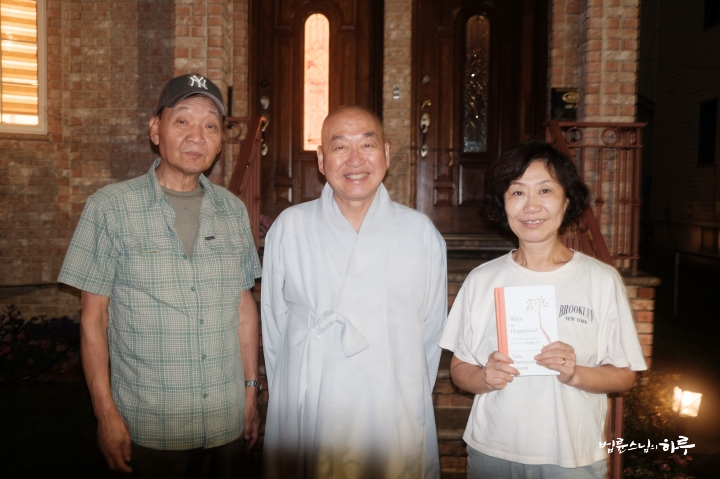
Arriving at the airport at 6 AM, Sunim completed departure procedures and checked his luggage, then met Jason and waited at the boarding gate for Toronto. The flight was delayed by about 20 minutes and took off at 7:48 AM.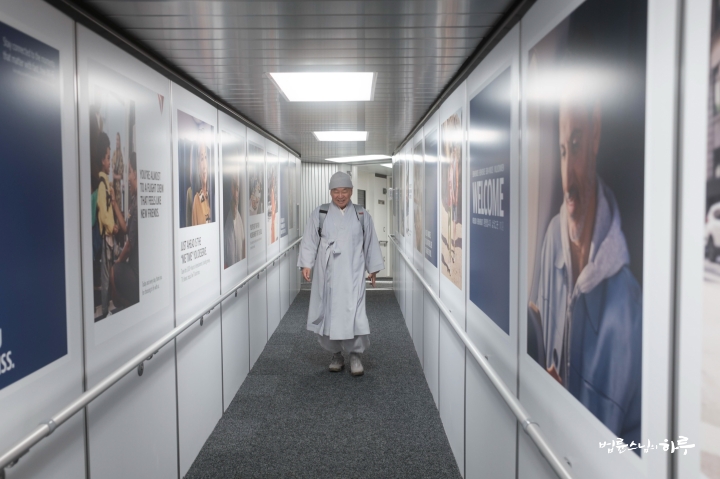

At 9 AM, they arrived at Toronto Pearson International Airport in Canada. After completing immigration procedures and exiting, Kang Mi-jung, who was in charge of organizing today’s Dharm Q&A, and Park Jin-dong, who came to provide driving services, warmly welcomed them.
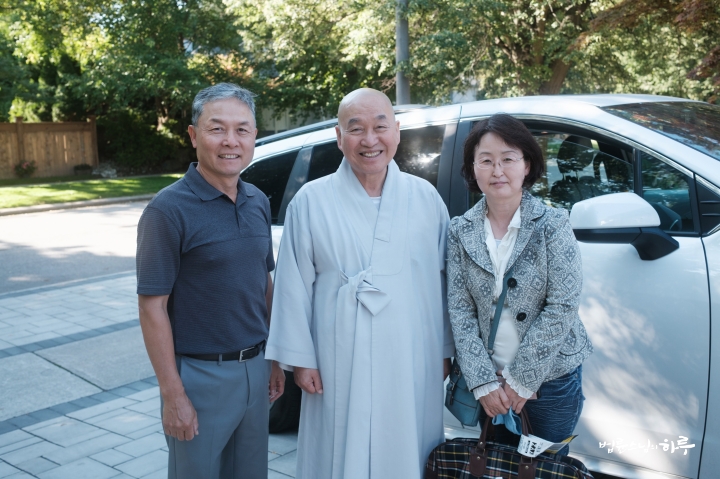
Leaving the airport, they arrived at 10:30 AM at today’s accommodation, the home of Jung Yeon-hee. Jung Yeon-hee’s family greeted Sunim with three prostrations, welcoming his long-awaited visit to Toronto.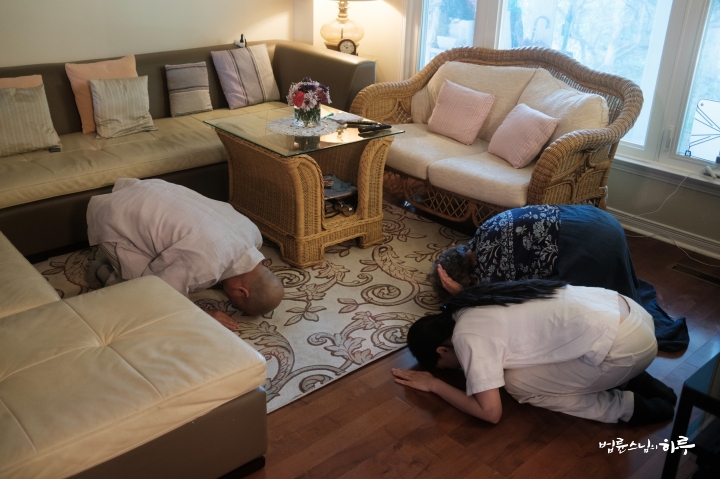
Since there was an English-interpreted Dharma Q&A at 1 PM today, they had an early lunch. After the meal, Yoon Kyung-sook, the Head of the North America Chapter of the Overseas Branch, residing in Jamaica, came to greet Sunim with her husband Kim Jin-wook, saying they had taken vacation time to come to Toronto. The couple offered three prostrations and had a brief conversation with Sunim.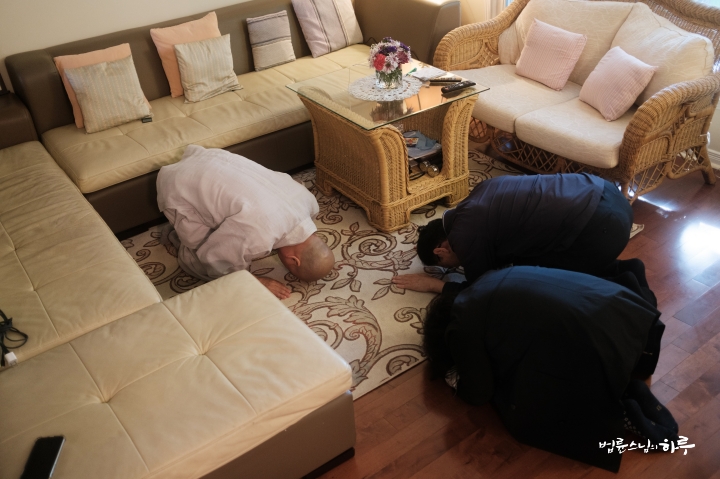
At noon, with Jang Hyung-won providing driving services, they departed for the University of Toronto where today’s Dharma Q&A would be held. The weather was very nice. Although there were concerns about whether students would come on a Sunday, there were more students at the school than expected.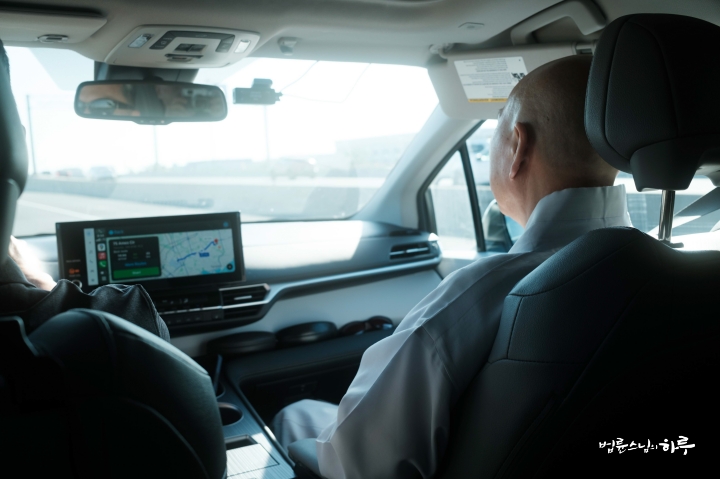
This Dharma Q&A came about when Sunyoung Ahn, a Jungto Society member working as a professor at the University of Toronto, discussed with Professor Sinae Kim from the Department of Religious Studies since last year about inviting Venerable Pomnyun Sunim. The University of Toronto has a large Department of Religious Studies, particularly with a Buddhist Studies program sponsored by the Robert H. N. Ho Family Foundation, where active research is conducted on meditation and neuroscience. Professor Seungjung Kim, director of the Ho Family Foundation Center for Buddhist Studies, also helped secure the lecture event venue.
The Robert H. N. Ho Family Foundation Center for Buddhist Studies is a charitable foundation established in Hong Kong in 2005, with Buddhist research and dissemination as its core objectives. It has strengthened academic foundations by supporting Buddhist studies centers, professorships, and programs at various universities including Stanford, Harvard, Toronto, and British Columbia. It also operates the Buddhist online journal Buddhistdoor Global, serving as a bridge between academia and the public.
Today’s Dharma Q&A was held at the William Doo Auditorium on the St. George Campus of the University of Toronto in Canada. This auditorium is used as a space where students and local citizens share academics and culture. It hosts various events including lectures, forums, and performances.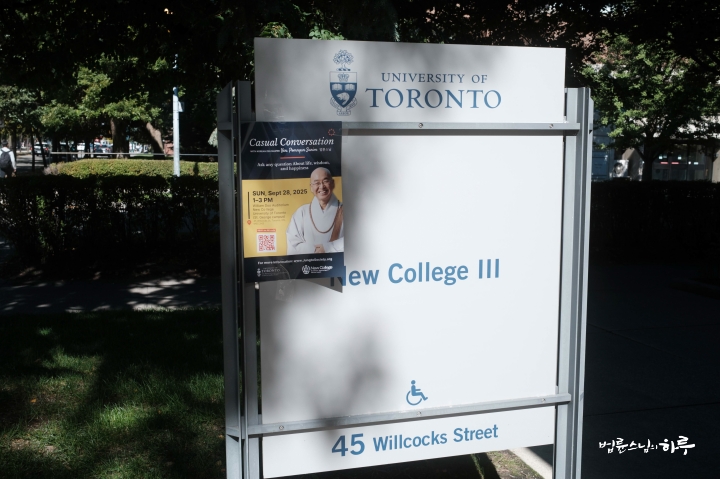
Upon arriving at the auditorium, volunteers warmly welcomed Sunim.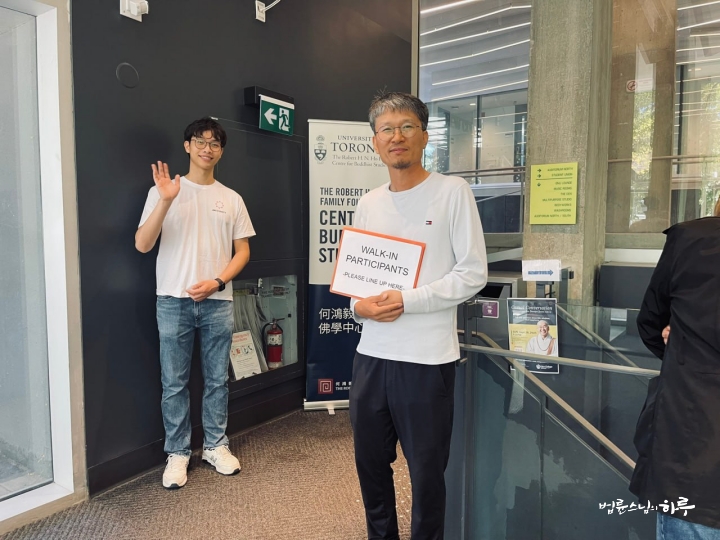
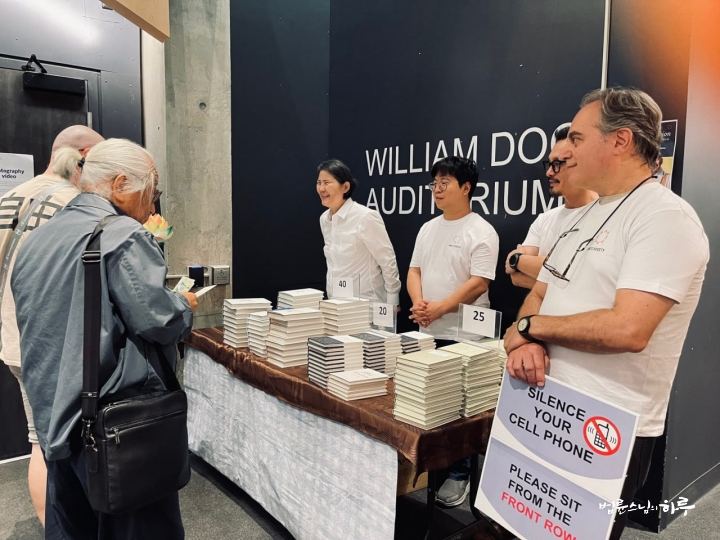
After greeting the volunteers, while in the waiting room, two Jungto Dharma School students and graduates came to greet Sunim. They shared how much happier their lives had become after learning about Jungto Society and attending the Jungto Dharma School. They expressed gratitude for being able to meet Sunim and Jason, who provides interpretation, in person after only seeing them through videos every week.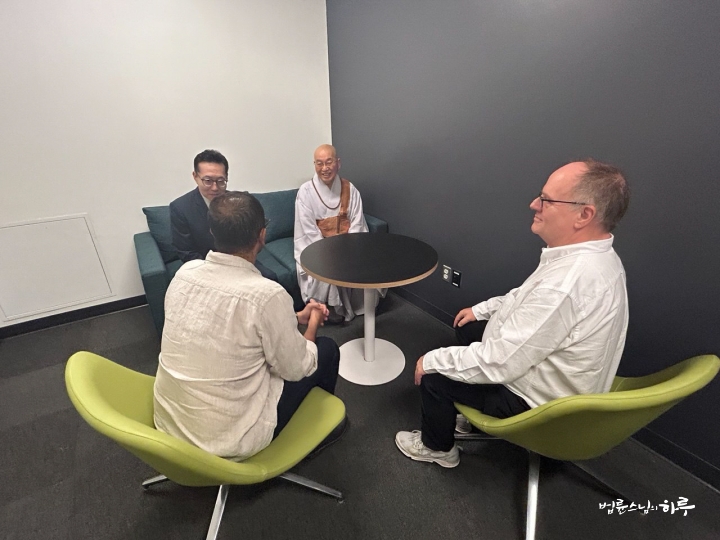
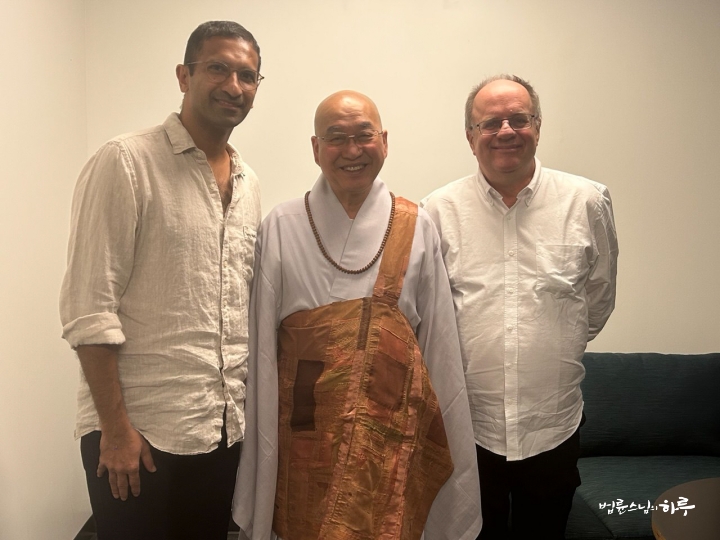
At 1 PM, the Dharma Q&A began with an introductory video about Sunim. When the video ended and Sunim took the stage, participants welcomed him with loud applause. Since the Dharma Q&A was held at a university, there were many young students in attendance. Including volunteers, about 200 people attended. First, Sunim first briefly introduced the Dharma Q&A format.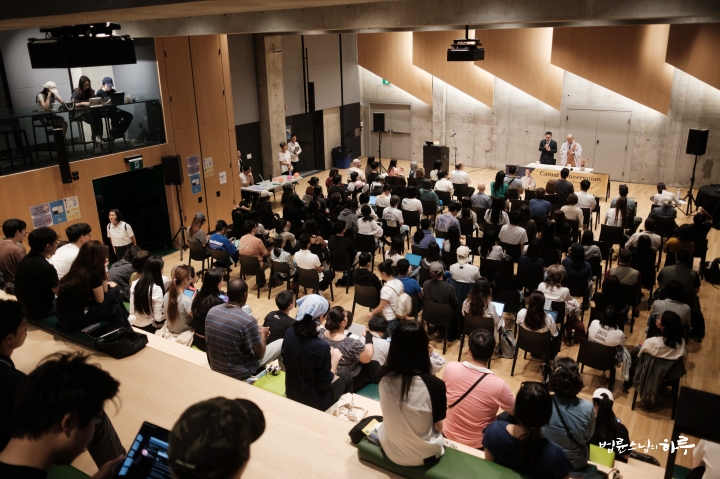
“What I want to have a dialogue with you about today is called ‘Jeukmun Jeukseol’ in Korean. It means asking questions without any preparation, just whatever comes to mind, and answering immediately without preparation. A Dharma Q&A is not about discussing a specific predetermined topic. You select the topics. The questioners select the topics based on your own interests. So at a Dharma Q&A, it’s not the speaker, but the participants, who determine the topic. Therefore, people can freely discuss any topic.”
Anyone can raise then raise their hand and ask Sunim questions. During the 1 hour and 30 minutes, 12 people were able to have conversations with Sunim. One of them questioned the meaning of success and wealth because he still felt empty, and asked how to deal with jealousy, regret, and comparing minds as sources of suffering.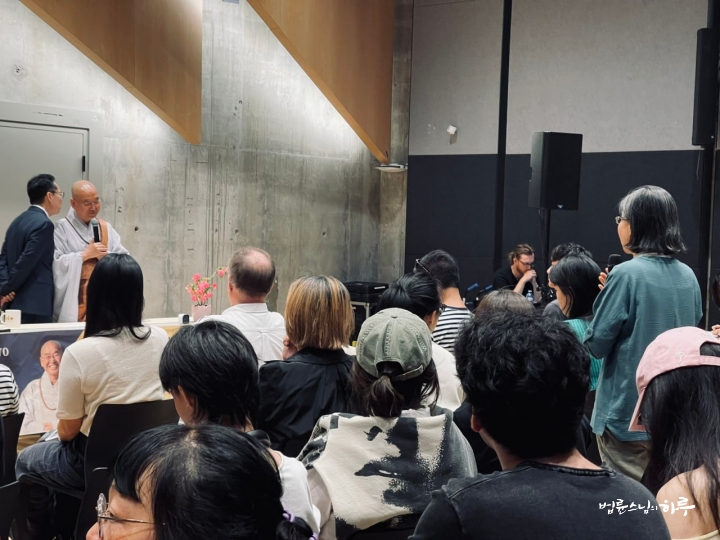
How Can I Deal with Jealousy, Regret, and Comparing Minds?
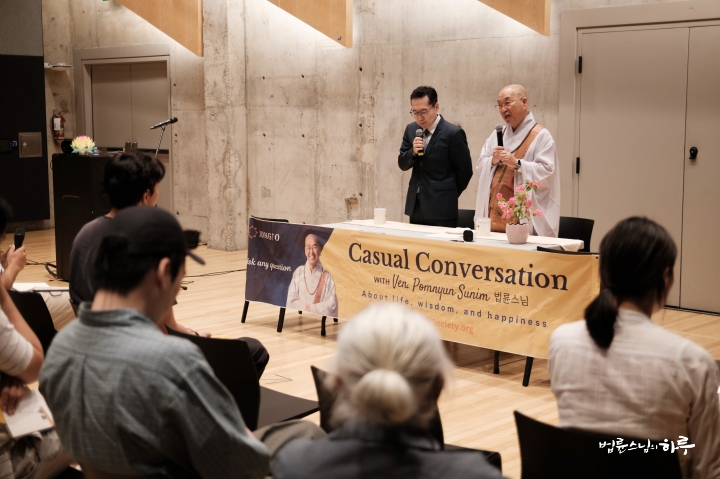
“Let me address your second question first. If we want to find a place with good conditions at a cheaper price when looking for housing, we need to look at many places. In other words, if we don’t have enough money, we need to put in more legwork. A place that seems good to me will likely seem good to others too, so it will be taken quickly. This is because human psychology is similar. So if you’re in a hurry, you’re likely to pay a higher price, and if you try to get a cheaper place, you might miss opportunities. You need to make appropriate choices within these conditions. There’s no other way. If something seems particularly cheap, you need to contract quickly, and if you want to find something cheaper, you need patience and time. If you need to sign a lease agreement quickly, you should be prepared to pay a bit more. It’s the same when selling. If you want to sell quickly, price it low. Conversely, if you want to get more money, you need to wait longer. You need to wait for someone who urgently needs to buy and is willing to pay more. But we struggle because we want to buy at a low price while also saving time, and sell at a high price while also saving time. This is called greed. If I wanted to buy a place at a low price, I would probably look at about 50 places. That way I can get a good idea of the general market price. This would be helpful not just this time but also when looking for a place in the future.”
You feel regret that you failed to lease the place you wanted, but if that place were still available, you probably wouldn’t have made a quick decision. Because if it were still available, you would look at other places. There’s an old Korean saying: ‘The beans in someone else’s rice look bigger.’ Things become regrettable only after we lose them. Within these principles, there’s no choice but to make appropriate selections.”
Returning to your first question, you said you feel empty. Why do you feel empty? Does a squirrel feel empty when going to sleep after gathering acorns? Does a cow feel empty when going to sleep? Feeling empty means wanting to fill something. It’s a problem that arises because something you want isn’t being filled. This also stems from desire. Without desire, you would just be tired in the evening and go to sleep. And in the morning, you would wake up and work. When you say you feel empty, it means you’re mentally pursuing something, and the problem arises because it hasn’t been achieved. It’s not about whether this is good or bad, but rather you need to be aware of your own state of mind. It’s not because you’re alone, but you need to diagnose yourself: ‘I’m craving something right now.'” 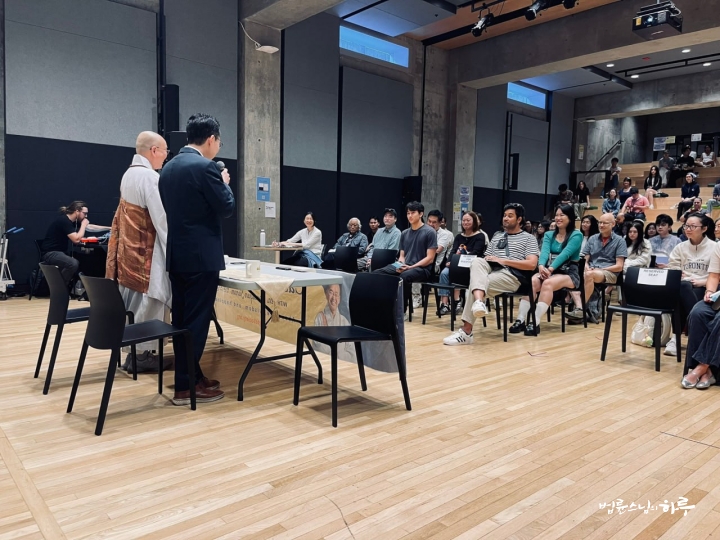
“I agree with what you’re saying. Earlier, I asked you about jealousy. We live in a capitalistic society where everything seems to be about comparison. For example, if I see a friend driving a sports car, I can’t help but feel jealous. As an ordinary person, unlike you, how can we find a healthy balance?”
“You shouldn’t start with the premise that you must not feel envy or jealousy. When jealousy arises, simply be aware of it: ‘Ah, I’m feeling jealous.’ If jealousy is effective for you, then feel jealous. A little jealousy or envy can sometimes give people courage or vitality. You shouldn’t approach it as ‘jealousy is good’ or ‘jealousy is bad.’ Jealousy can work negatively sometimes and positively at other times. Comparison can work positively sometimes and negatively at other times. For example, let’s say I’m walking along a path and my legs hurt, so I’m resting. Then I see someone carrying a heavier load than me who keeps walking. I might think, ‘That person is walking with such a heavy load, how can I just sit here? Let me get up and walk!’ So I get up. Because I compared myself to them, I was able to get up again. I don’t tell people that they shouldn’t compare. What I’m saying is that if your comparisons work negatively for you, then don’t make such comparisons.”
“Thank you so much.”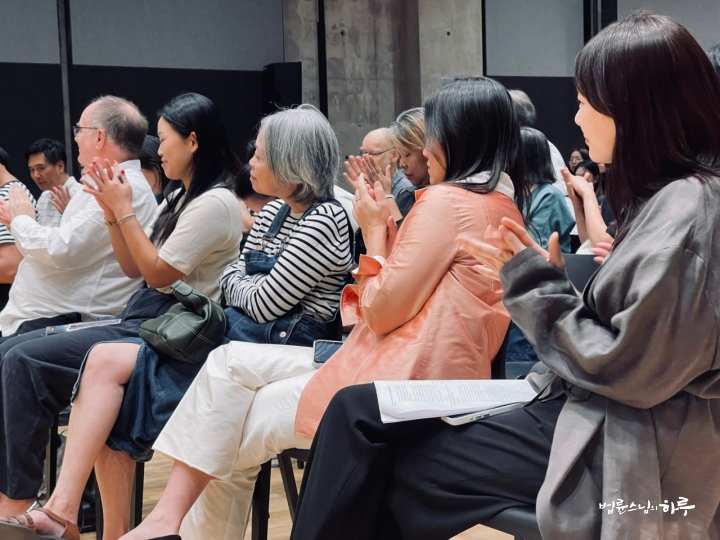
Questions continued one after another.
How can I overcome continuous failures and frustrations? It seems that just working hard is not enough.
I’m living with help from friends and family. How can I become independent?
Is sadness necessary to feel happiness? Do we need to experience suffering to feel happiness?
I discovered I had cancer last year, but now I’m trying to be happy. Did my karma from growing up in an unhappy family environment create my misfortune?
Is it possible to say that children in Gaza who are suffering from war and hunger are also suffering because of their karma?
How can we eliminate the discrimination that other young women are experiencing? It still seems like a male-dominated society.
When forming relationships with various people in society, if I meet someone with mental problems, I’m greatly affected. How can I maintain relationships without getting angry?
When we lose beloved family members, lovers, or friends to death, we can lose the meaning of life. How can we overcome such stress and anxiety?
I’m a nurse who provides chemotherapy treatment. It’s very difficult because I encounter death so often. How can I help people facing death find meaning in life?
Although there were more people who wanted to ask questions, Sunim had to wrap up the conversation regrettably as he needed to go to the next Dharma Q&A venue.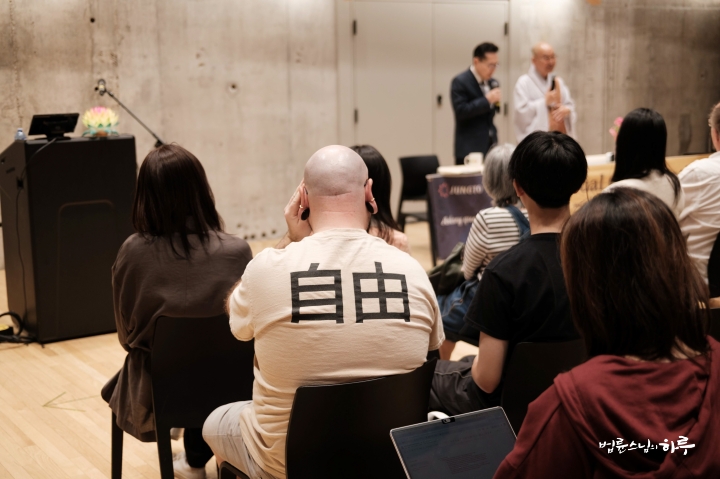
After the Dharma Q&A and book signing, Director Seungjung Kim of the Robert H.N.Ho Family Foundation Centre for Buddhist Studies said she had prepared University of Toronto merchandise and presented gifts to Sunim and Jason, who had volunteered as an interpreter. Sunim also gave signed copies of his books as gifts to the three professors who had prepared and invited him for today’s Dharma Q&A: Professor Sinae Kim, Director Seungjung Kim, and Professor Sunyoung Ahn.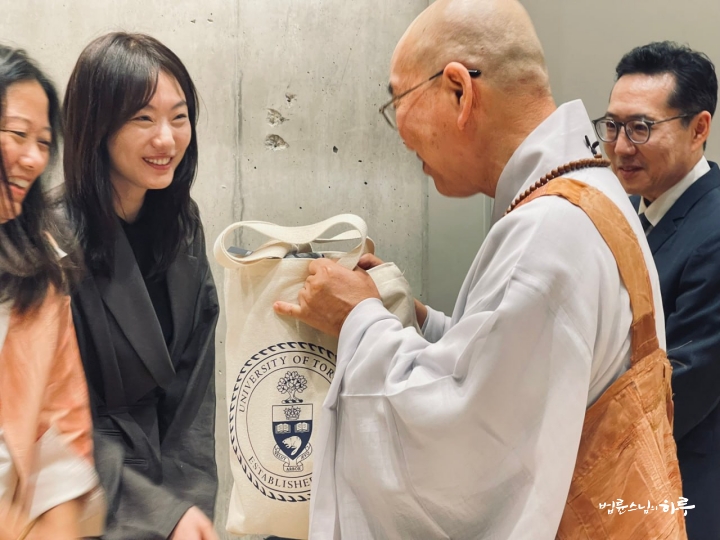
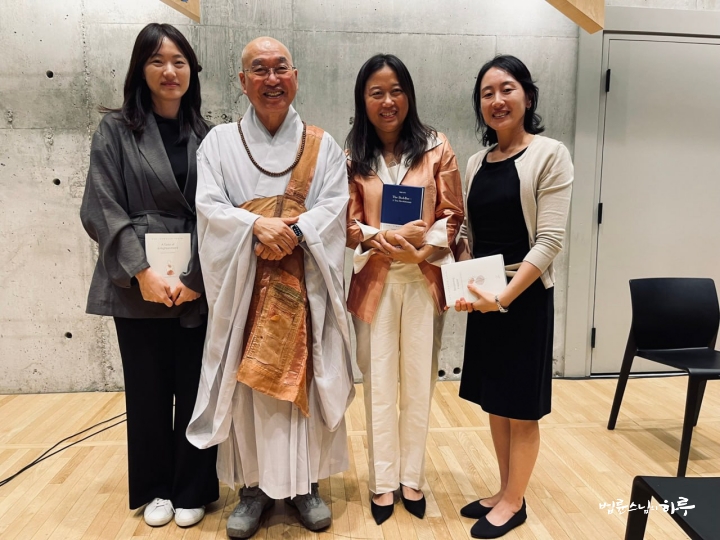
Many students participated in today’s Dharma Q&A, and the volunteers were all happy to have successfully shared the Dharma with both young people and English speakers at the same time. After taking a group photo with the volunteers, Sunim presented a book to Park Ok-sook, who had coordinated the Dharma Q&A, as a token of his gratitude.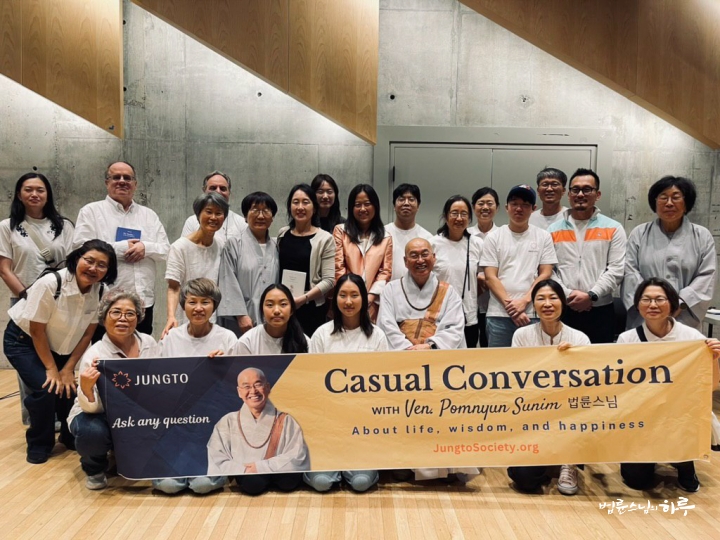
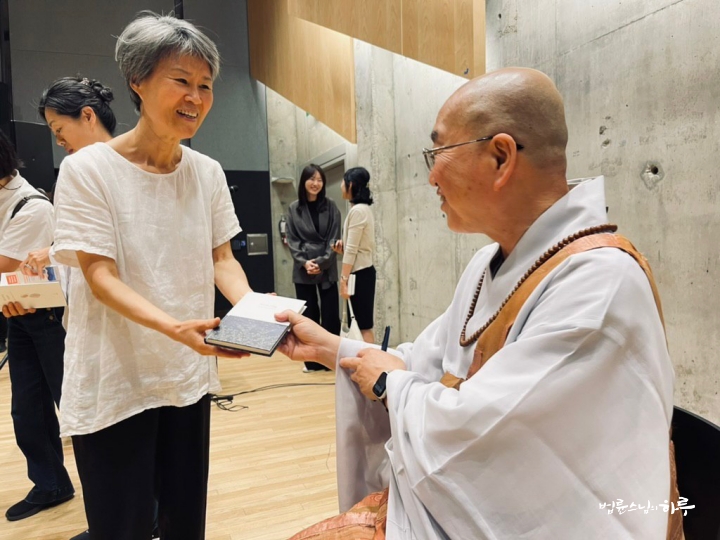
After cleaning up, the volunteers had a mindful sharing session with Dharma Teacher Myodeok.
“It was truly wonderful to be able to work together with the other volunteers. I would like to participate again if there are such events in the future. I’m grateful to feel that such positive things are happening here in today’s society where so many negative things occur.”
“This was an opportunity to realize that I cannot do anything alone, and it was a chance to truly feel that we are a mosaic Buddha.”
Sunim moved to the adjacent building and had a conversation with Professor Sinae Kim from the Department for the Study of Religion, Director Seungjung Kim of the Munk School, and Professor Sunyoung Ahn from the Department of East Asian Studies. The three professors once again expressed gratitude for Sunim’s visit to the University of Toronto and hoped he could visit more often in the future for more dialogues. They particularly discussed the possibility of Sunim visiting on weekdays next time to meet with professors researching neuroscience and meditation. After finishing the conversation, Sunim departed for the next Dharma Q&A venue, which was scheduled to begin at 4 PM.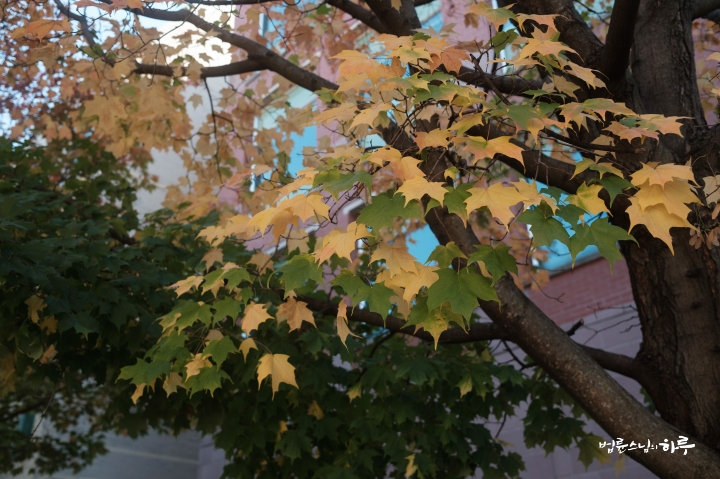
Today’s Dharma Q&A for Korean residents was held at Cardinal Carter Academy for the Arts located in North York, Toronto. When Sunim arrived at the event venue, volunteers greeted him from the parking lot. After exchanging warm greetings with the volunteers, he headed straight to the event vanue.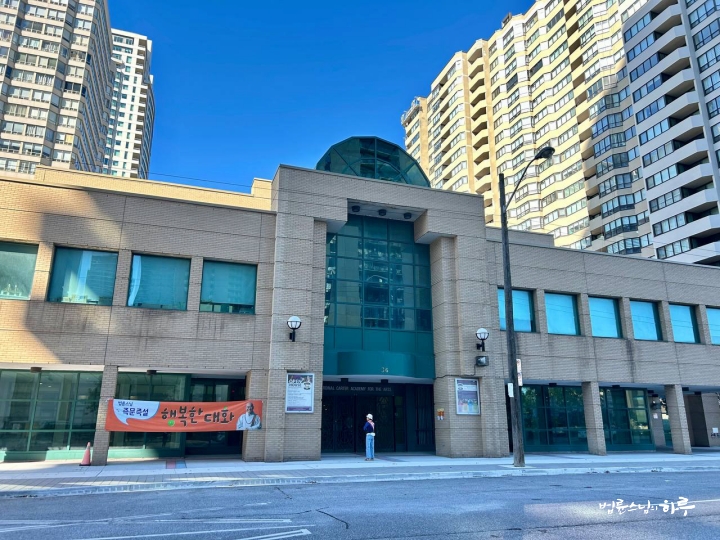
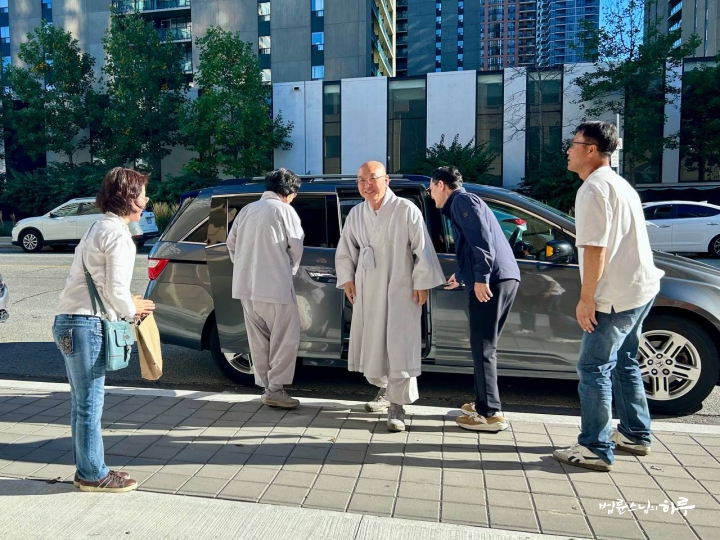
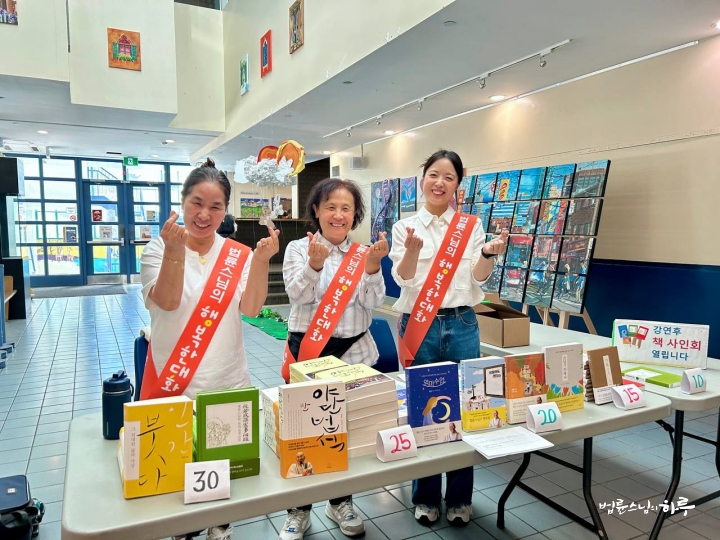
At 5 PM, the Dharma Q&A began with a video introduction of Sunim. There were many young participants. With about 250 people in attendance, Sunim began the talk with his opening remarks.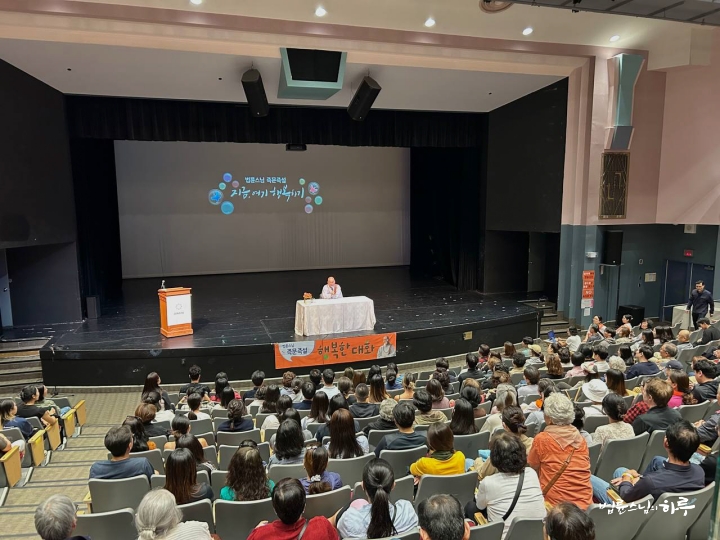
“I heard that Canada and the United States are having conflicts over tariffs, making life a bit tough. Are there any major problems for you?”
“There are many problems.”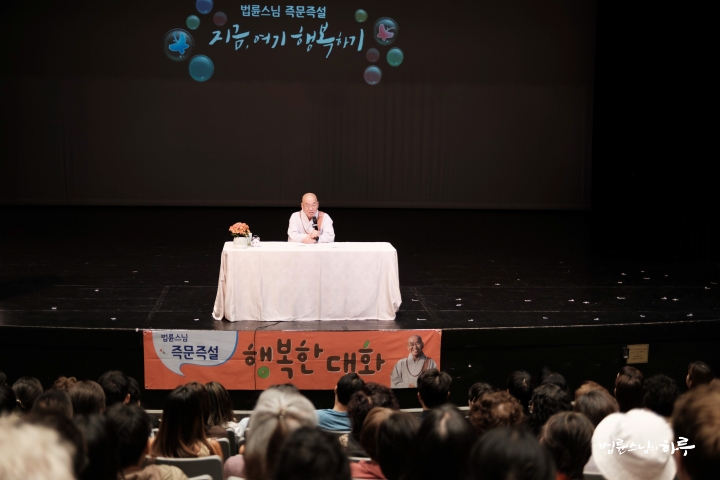
“South Korea is also having some conflicts with the United States over tariffs these days, though it’s not openly apparent. On the surface, it seems we got through it by acting somewhat submissively during the Korea-US summit, but substantively, the issues remain unresolved and conflict factors persist. Anyway, the world is quite turbulent right now. When I went to the UK, it took three hours from the airport to the event venue due to a subway strike. When I went to France, the prime minister faced a vote of no confidence and demonstrations were breaking out everywhere, causing chaos. When I went to Istanbul, the Supreme Court ordered the dissolution of the opposition party, leading to demonstrations, and although we managed to hold the Dharma Q&A, very few people attended due to the impact. We had scheduled a Dharma Q&A in Jakarta, but the demonstrations were so severe that assemblies were banned, so we ultimately had to cancel the event. Thus, many parts of the world are experiencing great turmoil right now. Even amid such chaos, we must live our daily lives, and we must do it without suffering.”
Anyone could then raise their hand and ask Sunim questions. For two hours at a faster pace than usual, 15 people had conversations with Sunim. One of them was suffering from repeated conflicts and fights due to his wife’s way of speaking and asked about ways to control anger.
I Get Furious and We Fight Repeatedly Because of My Wife’s Way of Speaking
Actually, doing what your wife wants – that is, doing what the other person wants – is the easiest method. Saying, ‘Oh, okay, let’s set the room temperature to 27 degrees’ is the easiest way. Then what’s the most difficult method? Setting it to 23 degrees as you want is the most difficult. Making the other person conform to you is the most difficult thing. But we all choose the most difficult path. What do you need to take the most difficult path? You need power. Whether it’s money or authority, you need coercive power to force the other person to change. You might be able to control the world with coercion, but it doesn’t work well between spouses. Conflicts arise because we always choose the most difficult path of trying to change others instead of the easiest path of changing ourselves.
Then what’s the Middle Path? It’s compromising at 25 degrees. You give in a little, and the other person gives in a little. But that also requires the other person’s agreement. When compromise doesn’t work, it will cost you money. You can use separate rooms. Then each of you can set your air conditioners to 27 and 23 degrees in your own rooms and live separately, sleeping together only occasionally when necessary. You don’t necessarily have to compromise.
You’re having problems because you’re trying to have your way without changing yourself. Just say ‘Okay, I’ll do as you say’ when your wife suggests something. When your wife calls and says, ‘Why didn’t you do the dishes?’ just apologize. When she says, ‘Make sure to do it properly next time when you go out,’ just say okay. Of course, if you’re busy next time, you might just leave. If your wife calls again saying, ‘Why didn’t you do the dishes when you said you would?’ just say, ‘Sorry, I forgot’ humorously. Then there’s nothing to fight about. When your wife says, ‘So what!’ just say ‘Well, I don’t know either.’ To me, you seem a bit petty. In married life, various things happen, and you should be able to laugh off things like this.
When you get older and your hair turns gray, it’s wise to just listen to your wife about most things. Especially if you have two or more children, it’s better to just listen to your wife. People who have been married for a long time all say this. Say, ‘Honey, I’ll do as you say.’ When your wife says something else, say, ‘Let’s try that.’ Of course, if you want to do something your way, just do it. A husband isn’t his wife’s slave, so you can’t do everything your wife wants. Then when your wife raises an issue again, say, ‘Sorry, I forgot’ and laugh it off. Even I, who has never been married, know how to handle things lightly like this. Why did you get married even without even knowing even this? How can you live a married life without understanding something so basic?”
“I didn’t know it would be like this before marriage.”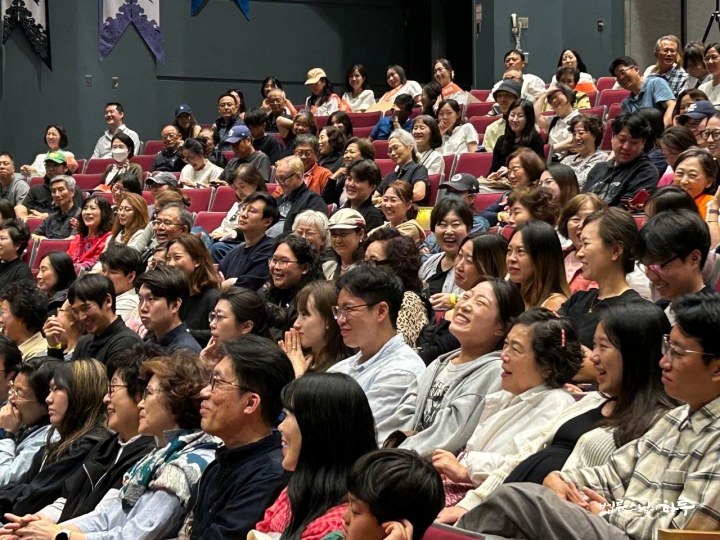
“Even if you didn’t know before marriage, after living married life until now, you should be able to take such things lightly and move on. Those things aren’t big problems. However, marital fights have a big impact on children, so you must be careful in front of them. From what you’re saying, it seems everything else is fine except for arguing with your wife. If everything were bad, it would be difficult to live with her. So just laugh off things like that. From today, have the perspective of ‘You are the queen,’ ‘Everything you say is right.'”
“But when anger rises, I can’t control it.”
“You shouldn’t create situations where anger will rise. You can’t ask, ‘How can I control my anger?’ or ‘How can I manage my anger?’ when anger has already risen. That’s like lighting a fire under a pot and asking, ‘The water is boiling, how can I cool it down?’ If you pour a bucket of cold water, it seems okay for a moment. But it will boil again soon. In such cases, you need to turn off the fire under the pot. Completely removing the fire means unconditionally saying ‘You’re right. I’ll do that.’ If you do this, you won’t get angry.”
“I understand it in my head, but…”
“Don’t worry about what’s right or wrong. Just start doing it from today. Don’t even say things like ‘I understand, but…’ The Buddha’s teaching is that there is no right or wrong. It’s about making your own choice. You’ve lived with your wife for a long time, so you know her well. If you’ve concluded that ‘My wife is great in every other way, but her temper is hard to change,’ then just decide, ‘I’ll adjust to her.’ Or do you really hate the idea of adjusting to your wife?”
“I’ll give it a try.”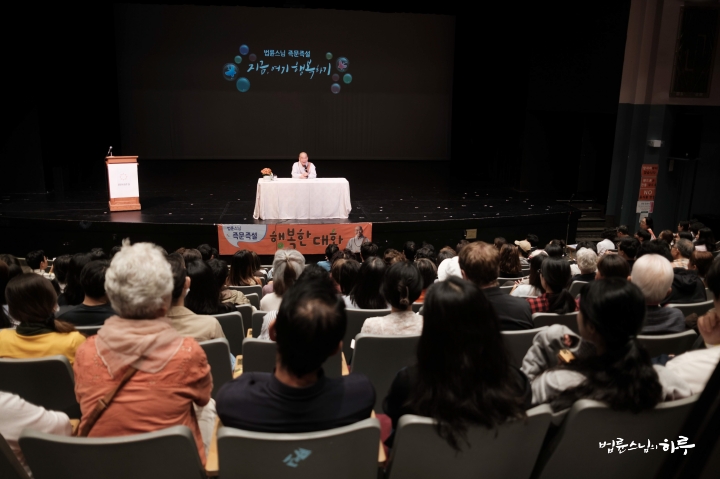
“It’s hard to say ‘yes,’ isn’t it? It’s really difficult. But if you keep saying ‘yes,’ nothing becomes easier than this. When your wife says something, don’t give a long response. Just say lightly, ‘Yes, I’m sorry.’ When your wife says, ‘Do this,’ just say ‘Yes.’ If you have something else to do, just go out. Then your wife will say, ‘Why didn’t you do it?’ Then you can say, ‘Oh, I’m sorry. I forgot.’ Try to live with a bit of humor like this. If a couple lives together rigidly, nitpicking every single word, they’ll be fighting and making noise every day, making life unbearable.”
“Thank you. I understand.”
Questions continued one after another.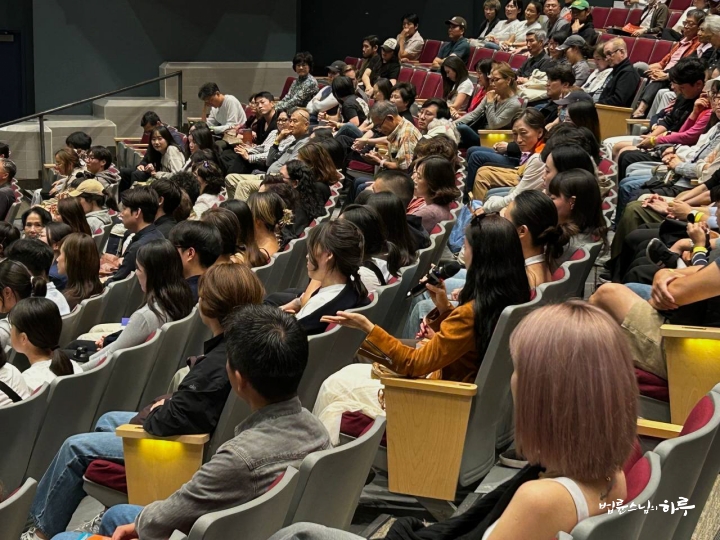
What mindset should I have when facing difficulties in daily life?
I finished high school in South Korea and attended university and graduate school in North America. As someone who has decided to live abroad long-term, is my interest in South Korea affection or meddling?
I came to Canada on a working holiday and am working here, but being a bit older, I feel very anxious.
I want to lead light conversations, but I’m not good at it.
I’m not sure if it’s right to have children and make them live in this difficult world, or if not having children would be better for them.
My sibling has hearing difficulties and faces many limitations in life. How should they live?
When meeting people, is it better to know their personality types like MBTI first, or to slowly figure out their tendencies?
Between my 3-year-old who keeps asking to be thrown onto the bed and my husband who actually throws the child, who should I tell to stop?
Should I just endure suffering or find a way to overcome it?
I want to go on a pilgrimage to India, but it seems too difficult do so from Canada.
I want to return to Korea and become a police officer, but since the pay is low, I worry that if I can’t provide enough support for my children later, they might resent me.
I’ve lived my life without confidence, but recently I found something I really want to do. However, I keep struggling with whether or not I’m capable of doing it.
When my wife and I exchange hurtful words, it often leads to big arguments, which I feel isn’t good for our child. Even after the fight, I stay angry. I know this in my head, but it doesn’t seem to get better.
Perhaps because of the hard immigrant life, I respond negatively when my husband shares his opinions. I worry I’m crushing his spirit too much.
After answering all the questions, Sunim offered words of encouragement to the Korean expatriates.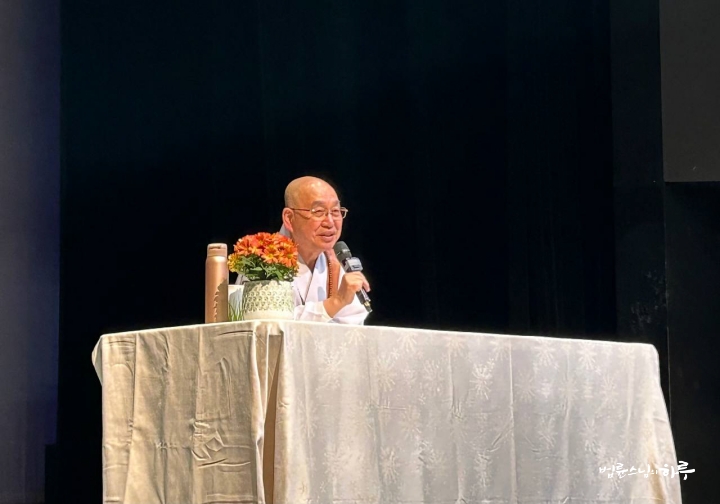
“Living far from your homeland is not easy. Even when you say, ‘Life is difficult,’ I think you’re fortunate to be living as well as you are. I don’t think I could do it. Thank you all for living well.”
The Path to Living Happily Even Away from Home
“Since you’ve decided to live here, it’s best to live happily. Some of you may have come because your parents immigrated, others may have come on your own or followed someone else. But since you’ve decided to live here, regardless of who made the decision, it’s important to stop blaming others and actively accept this life as your own. If at some point you feel that this life isn’t right for you, remember that you all have an escape route back to Korea. If I get tired of being a monk, I can grow my hair and leave the temple. So, please try to see your given circumstances in a positive light and live lightly. Don’t carry the burden of life too heavily; approach life with a lighter heart. I hope all of you can live happily, without suffering.”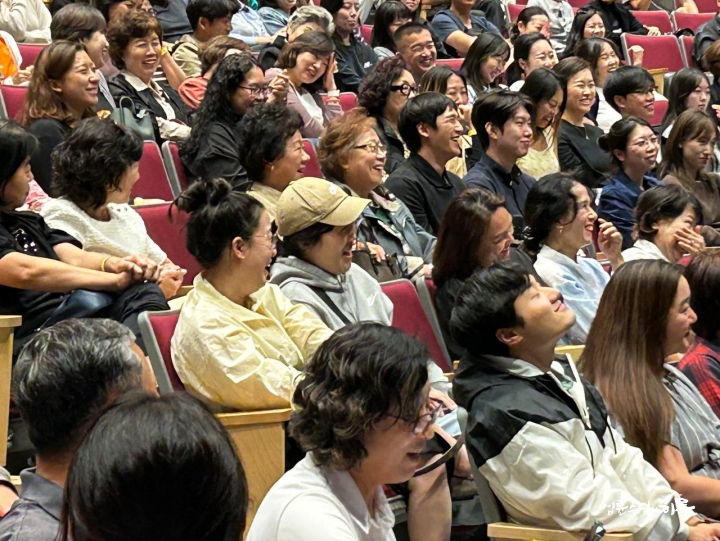
The Dharma Q&A ended with loud applause. A book signing session immediately followed. Most attendees formed a long line to get their books signed. While receiving their signatures, most of them expressed their gratitude to Sunim.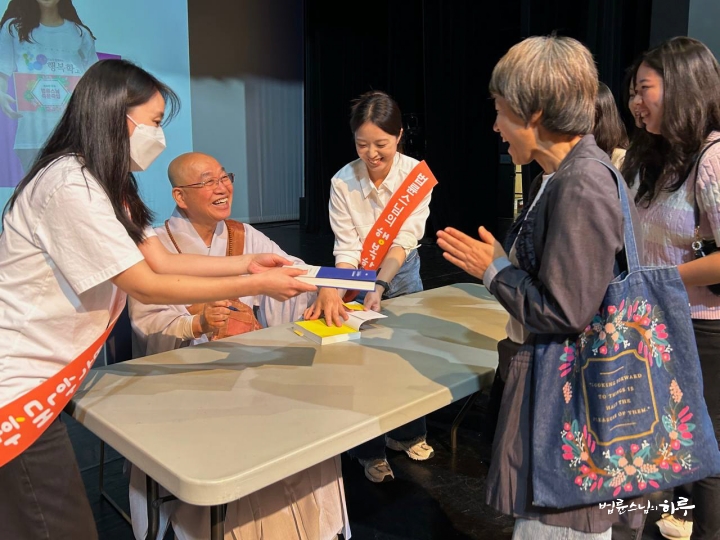
Next, Sunim took a commemorative photo with the volunteers who prepared the event. He presented a signed book to Kang Mi-jung, who was in charge of organizing the Dharma Q&A.
“Thank you all for your hard work.”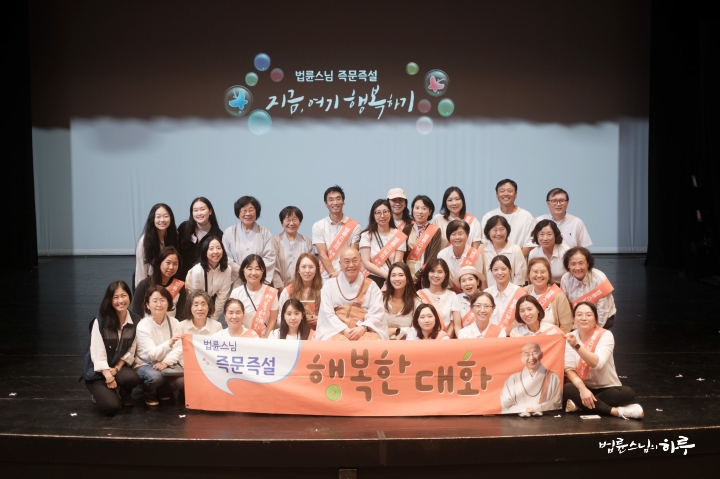
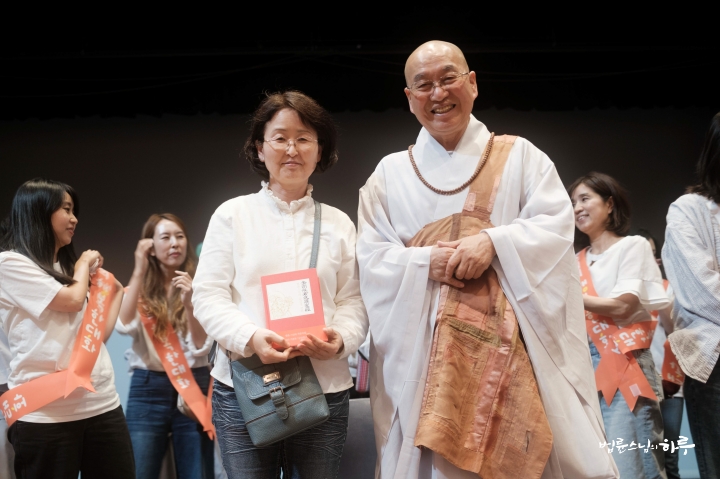
After shaking hands with the volunteers and expressing his gratitude, Sunim went to his accommodation. The volunteers had a sharing session with Dharma Teachers Myodeok and Beophae. The volunteers shared how volunteering made them feel even happier than just participating.
“After completing the Happiness School, there were no in-person activities. I’m so grateful to have met many people as a volunteer at Sunim’s talk.”
“It was wonderful to volunteer again with people I met last year. I’ll volunteer again next year.”
“I had almost no interaction with other Koreans, but thanks to Jungto Society, I feel like I’ve come out into the world.”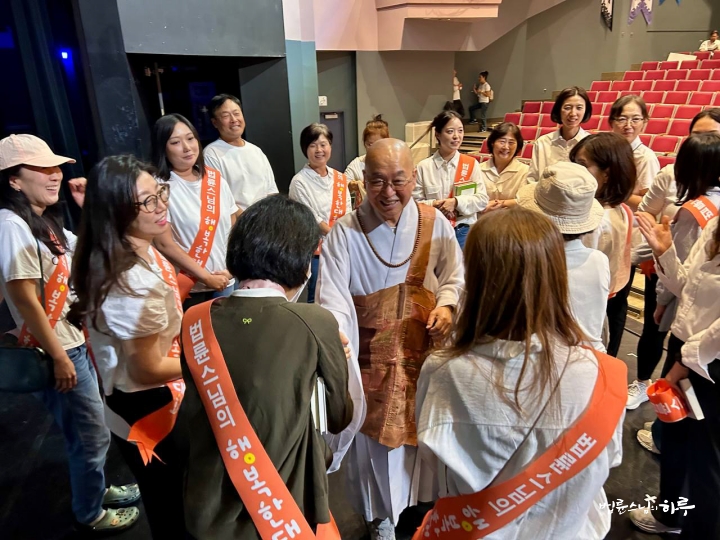
Sunim arrived at the accommodation at 8 PM and had a late dinner. After communicating with the team in Korea and discussing the schedule for the next day, he went to bed.
Tomorrow, he will travel to Washington D.C. and spend the entire day meeting with representatives from American think tanks, government, and Congress to discuss ways to improve North Korea-US relations and peace on the Korean Peninsula.





